
The Business of Fashion
Agenda-setting intelligence, analysis and advice for the global fashion community.

Agenda-setting intelligence, analysis and advice for the global fashion community.
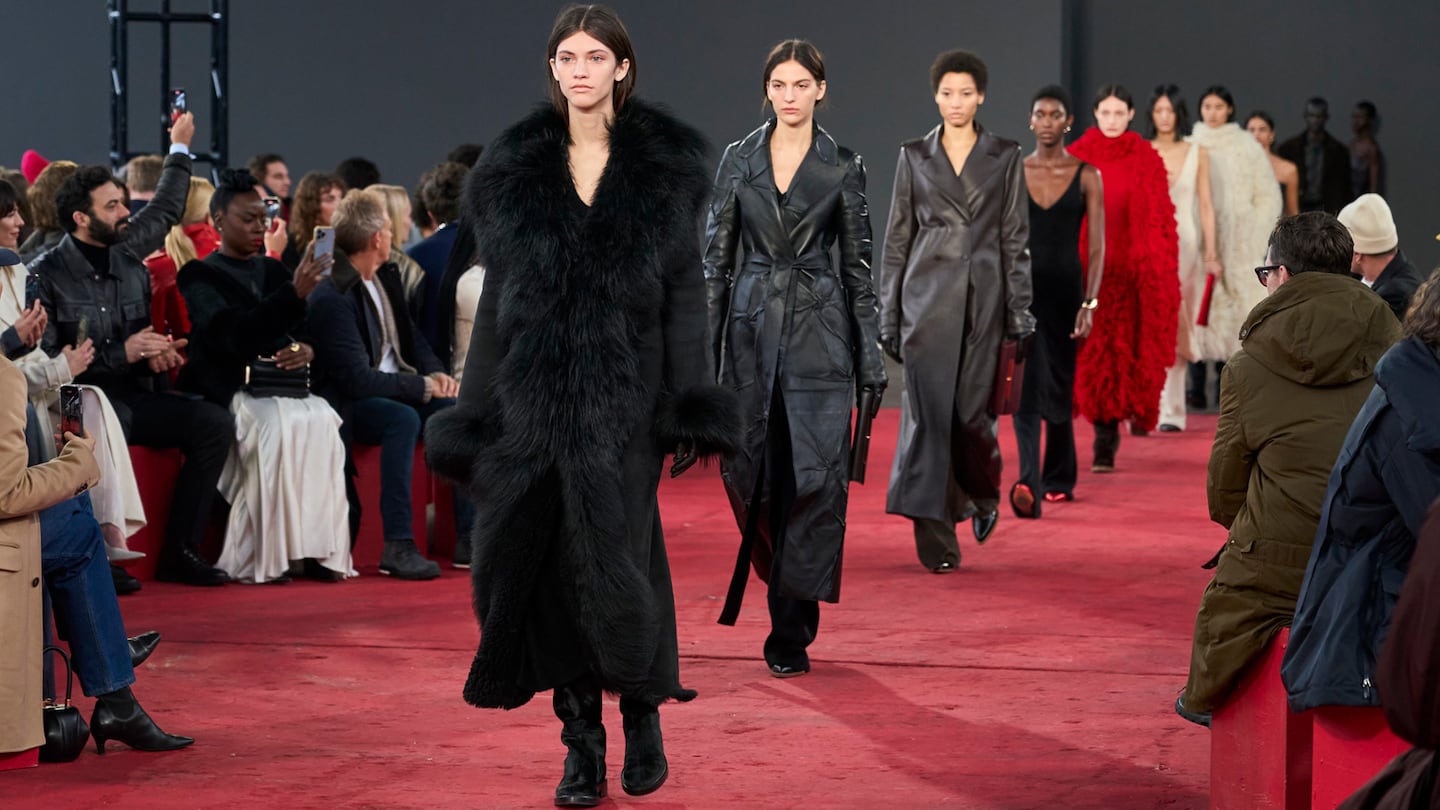
NEW YORK — The animal rights protester who tried, and failed, to walk the Coach runway with a sign reading “Let Cows Live” could have chosen any number of catwalks to disrupt this season. Why this one? It was actually the rare event that did not feature a floor-sweeping leather coat. And what to make of this desire for swagger? Does it portend a yearning for protection, armour for a terrifying world?
Coach staged its show at the James B. Duke House, an Upper East Side mansion that once belonged to Doris Duke’s family. The press dubbed Doris “the Million Dollar Baby.” She inherited the 32-room house when she was fourteen years old. In 1958, the building was donated to New York University.
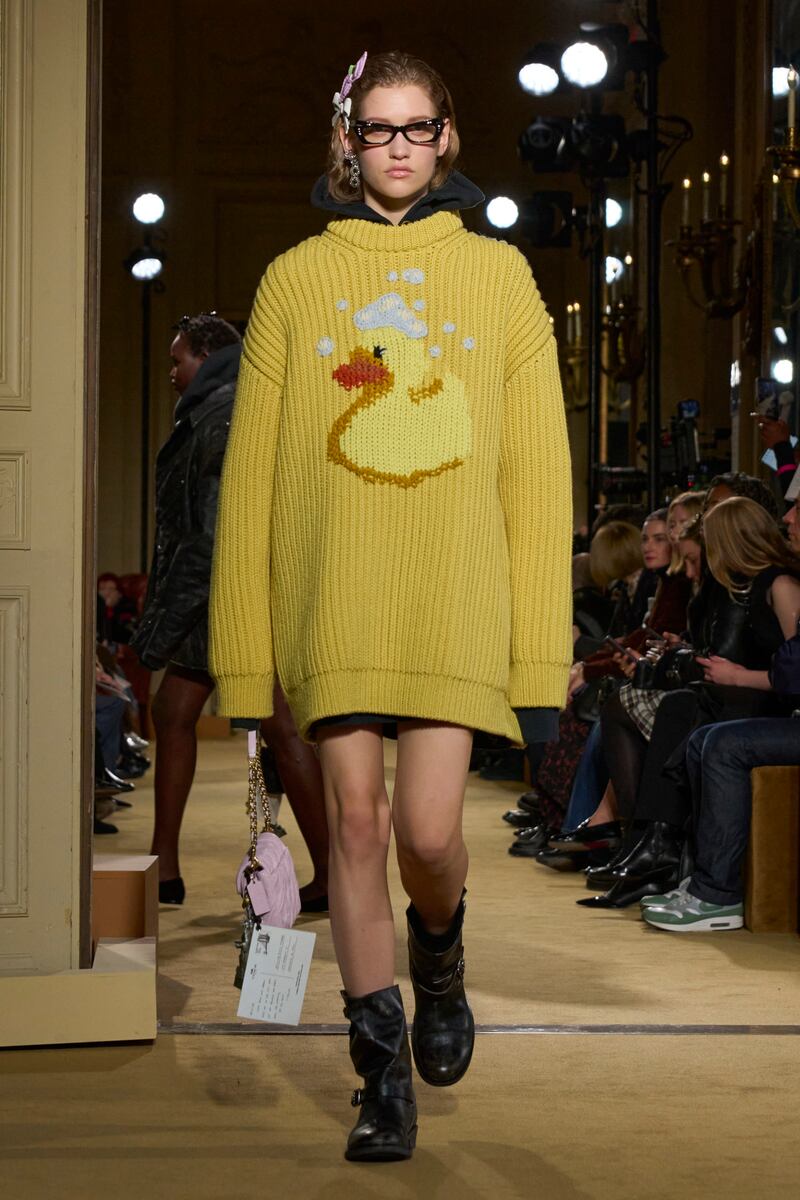
Had it remained a private residence, you can imagine a feisty young woman sweeping down the majestic staircase in one of Coach’s vastly oversized pullovers — maybe the yellow one with the duck on the front? If she is sick of wearing a long leather overcoat, she could trade it for Coach’s fringe suede jacket, more reasonably priced, surely, than the western wear on the Vuitton runway in Paris last January. Whatever she chooses, she needn’t bother to muck up her own combat boots; Coach appears ready to provide this princess with artfully pre-scuffed footwear.
A plethora of experimental techniques and fabrics were pressed into service at Tory Burch’s show, in the grand hall of the New York Public Library: Heat-sealed seams! Nylon, a distant cousin of a shower cap! These were employed in the creation of an unbending faux-croc suit, and a tiny swirly tutu dress; and, for comic relief, a couple of nutty dresses made of tinsel raffia. Merry Christmas! An elongated version of the handbag Burch named after Lee Radziwill was presumably meant to convey an aura of upper-crust hauteur.
ADVERTISEMENT
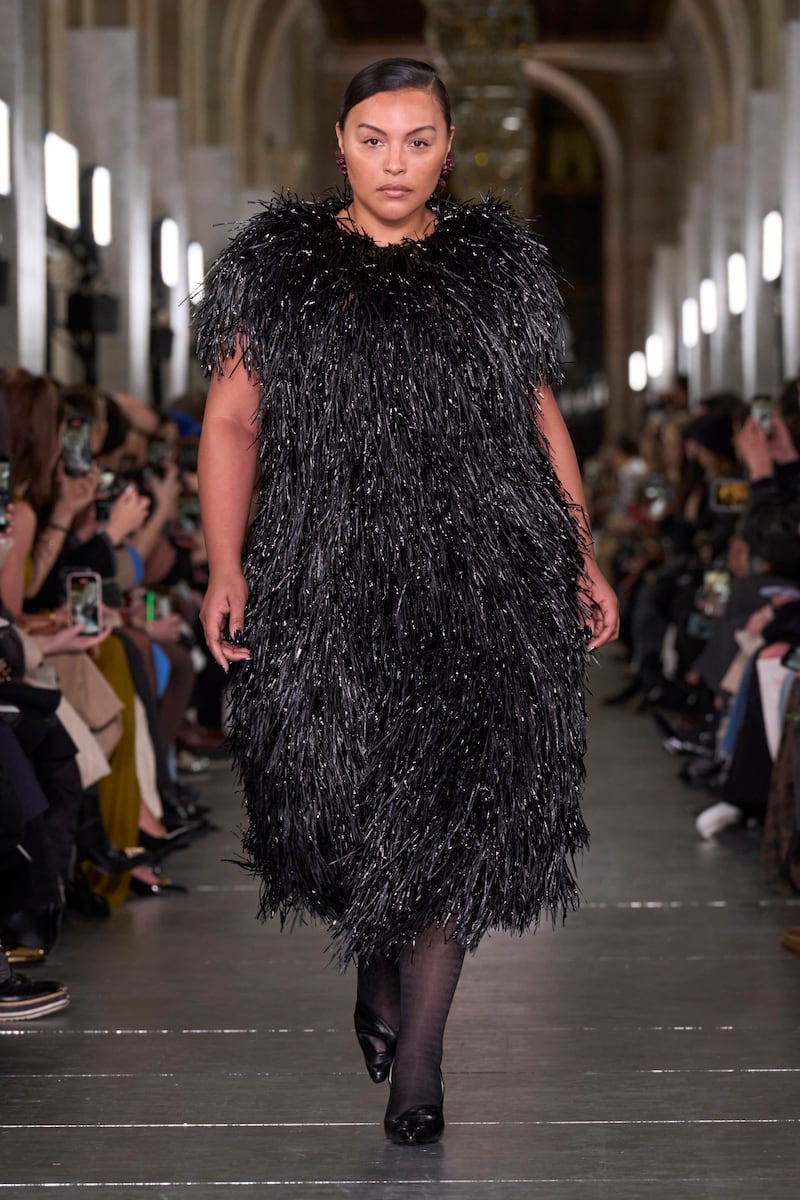
If you were willing to schlep to the Brooklyn Navy Yard in the snow, Gabriela Hearst at least rewarded you with a lavish buffet. The floor was painted red, and we sat on red cubes as the first look appeared which was — bingo! — yet another long black coat, this time in shearling, but with leather to come. There was so much sheepskin on the runways this season, and a lot of the time it was worked so that the furry side showed, that it seemed as if we might be inching closer to that anathema, the fur coat, and perhaps expressing a longing to rehabilitate this exiled outerwear.
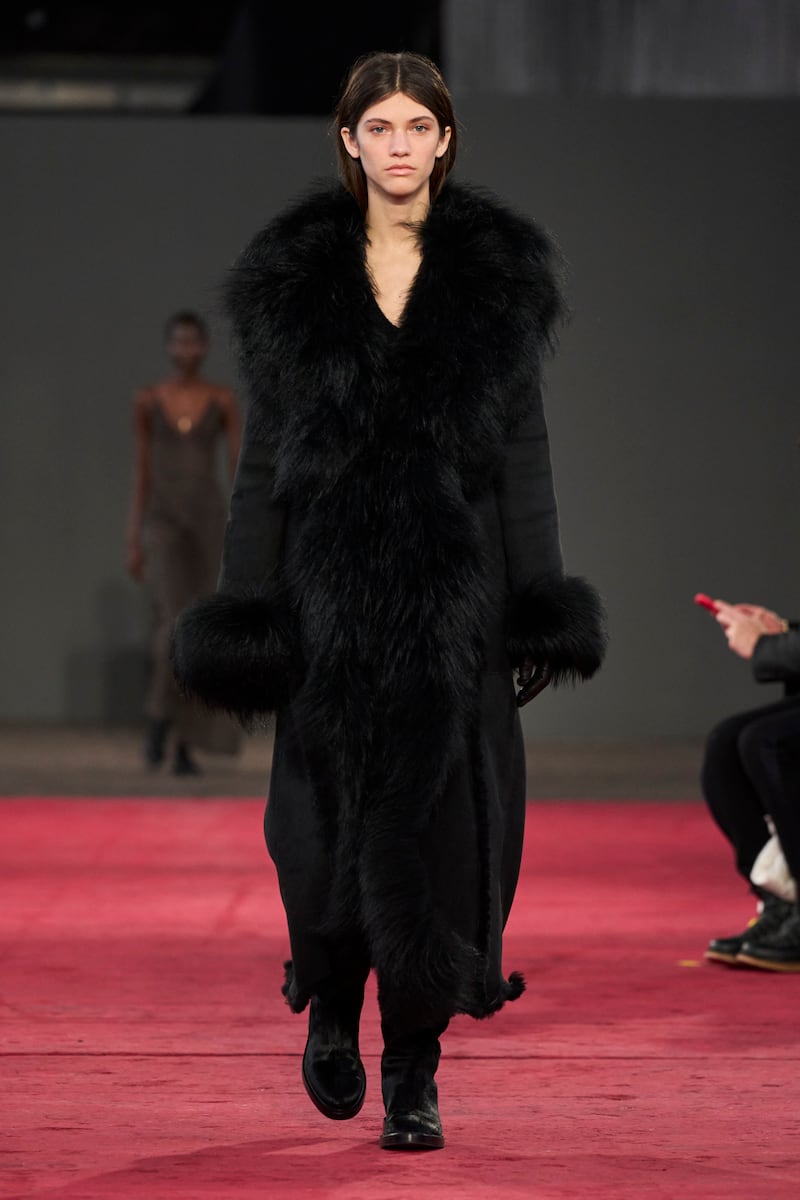
The yen to don something fuzzy next winter — throw that puffer in the trash! — was likewise on display at Michael Kors, who salted his audience with Kors-dressed celebrities, including Blake Lively in a giraffe-print calf-hair balmacaan. A pale pink coat of curly lamb could be tossed over one of Kors’ lacy slip dresses, but would be sexier hanging open, revealing a tank undershirt and low-slung trousers. The show took place in the original Barneys on 17th street, a location suffused with nostalgia for many in the audience. This was a store that stocked retail dreams; now it is a great white empty whale in Chelsea. When Bobby Short, once the resident performer at the Café Carlyle on Madison Avenue, sang “I Happen to Like New York” on the soundtrack as the models took their final walk, you were seduced, if only for a moment, by the idealised city that still mesmerises Kors, a place where women in stilettos — because they have a car and driver! — live impeccable impossible lives in sequinned shifts.
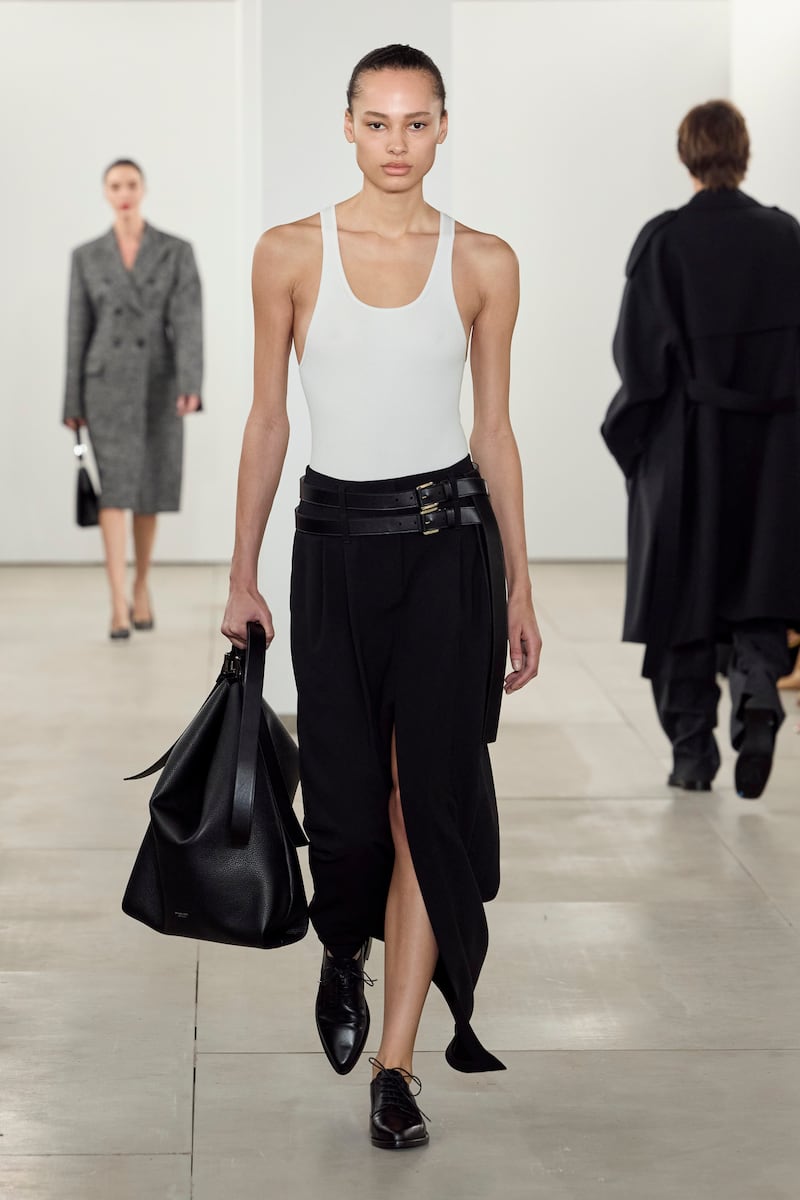
There is no getting away from those Capote swans. If they were not gliding down a runway at Michael Kors, they were literally opening the show at Batsheva. Molly Ringwald, who plays Joanna Carson on the influential mini-series, was the first out of the box, clad in a hooded black widow-ish dress. This was only one example of Batsheva’s credo, a kind of droll bohemianism: Little House on the Prairie meets Elvira, Mistress of the Dark. But then again, who doesn’t like a slouchy sequin capelet slipping off one shoulder or a leopard frock that has the audacity to be trimmed with tulle?
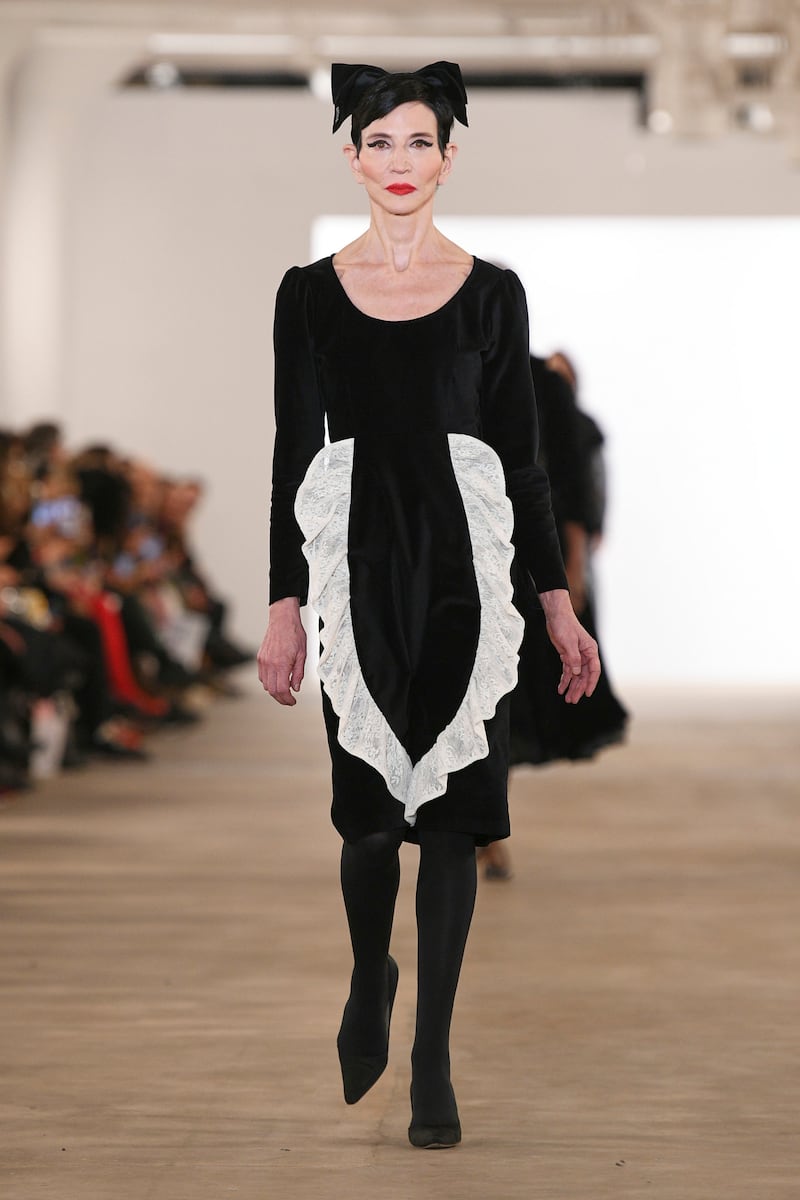
Whispers turned to screams: Beyoncé in the house! Beyoncé! Not just Bey, but her sister and mom trekked to Bushwick for the Luar show, which was the celebrity get of all time and left all other attempts at star-studded front-rows in its rearview mirror. The Knowles were in attendance to see Solange’s son walk the runway, and there he was, in a leather suit of vast proportions over a white shirt and cravat — a new kind of subversive black tie. Luar always attracts a wildly enthusiastic crowd, and this night it hit new heights of hysteria, threatening to undermine the reason we were ostensibly there: to see the clothes.
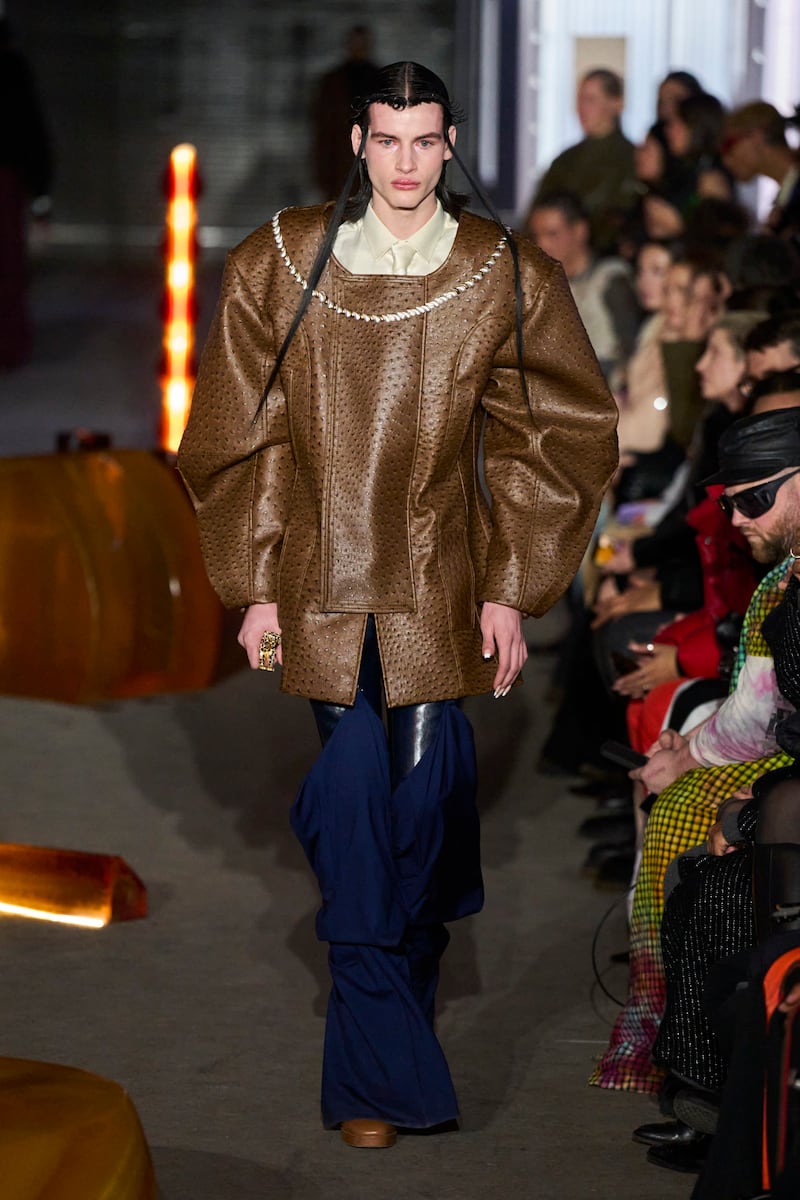
From what could be gathered from the models sprinting by in the semi-blackness, the collection was a revisionist take on “metrosexual”— a further exploration of the notion of Executive Realness that Luar continues to investigate. The designer’s trademark massive shoulders, squared and ready for boardroom battles, were given Elizabethan puffs; leather jackets had wide open bejewelled necklines; a skirt suit, shown on a woman but also fine for a guy, was reimagined in denim. To balance the colossal silhouettes, there were fur legwarmers so capacious they could be mistaken for boots, and furry mitts to render your hands chic but useless.
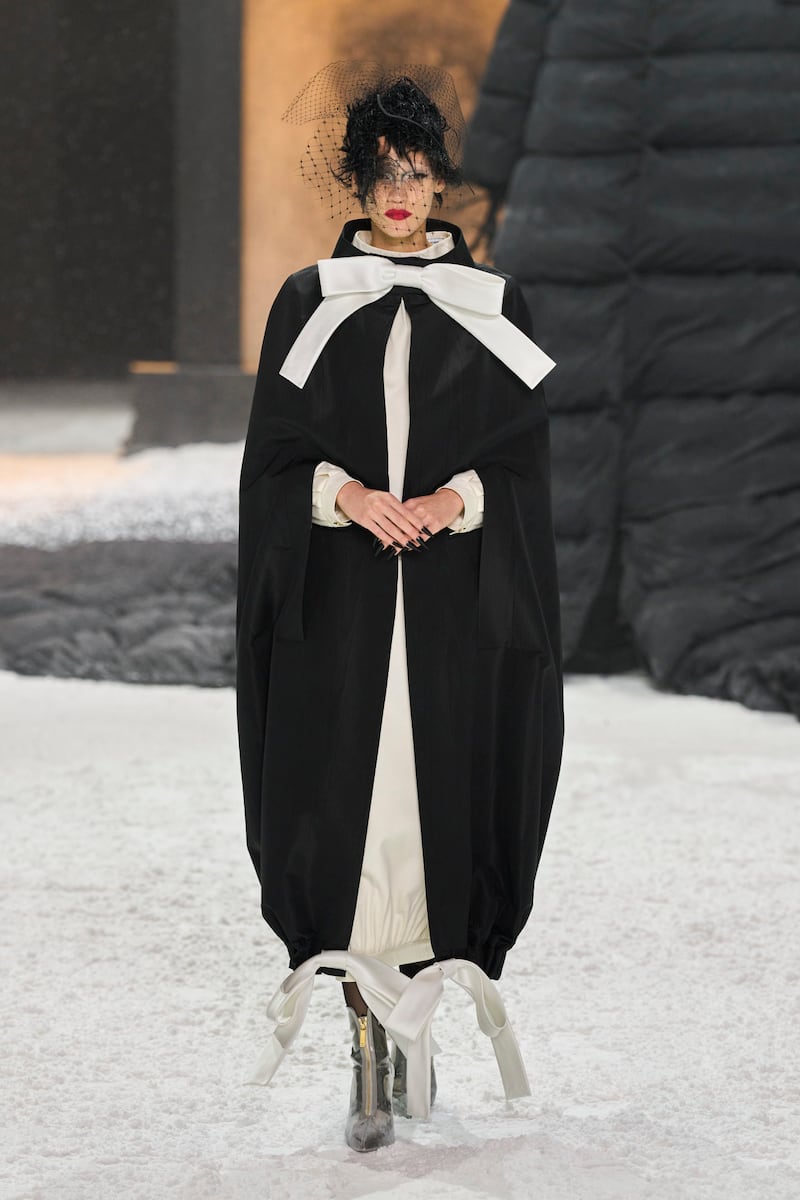
Centre stage at Thom Browne’s fractured fairy tale was occupied by a figure thirty feet high, with a model’s face and a tree branch growing out of its head. This terrifying character wore a massive garment with a slit, from which emerged a quartet of Browne-clad kiddies. A raven cackled, and Carrie Coons, who plays the parvenu Mrs. Russell on The Gilded Age, read Edgar Allan Poe’s “The Raven,” as models in bizarre but irresistible ensembles ambled by. If there was no lack of Browne’s usual fantasias, there were also clothes that surprised with their wearability: a trench shyly signalled its signature striped lining; a small gold cardigan topped a huge raven-printed skirt; a Poiret-esque coat closed with big bows.
At the end of the affair, Browne came out carrying a giant red heart for his partner, Met curator Andrew Bolton. Coons’ anguished “Nevermore” ceased, and the soundtrack shifted to “At Last.” Beyoncé, who, for better or worse, will be remembered as the queen of this particular New York fashion week, performed this song at the 2009 presidential inauguration. If you closed your eyes you could still see Barack and Michelle dancing to it: a bittersweet reminder of what once was, and a faint hope for the rough times ahead.
On the first three days of New York Fashion Week, runways full of perfectly respectable clothes were punctuated by flashes of something more eloquent, writes Lynn Yaeger.
At a quirky runway show ahead of New York Fashion Week, it was as if Mary Weiss of the Shangri-Las had found her way to Tokyo and sat down to share a Marlboro with Rei Kawakubo.
From where aspirational customers are spending to Kering’s challenges and Richemont’s fashion revival, BoF’s editor-in-chief shares key takeaways from conversations with industry insiders in London, Milan and Paris.
BoF editor-at-large Tim Blanks and Imran Amed, BoF founder and editor-in-chief, look back at the key moments of fashion month, from Seán McGirr’s debut at Alexander McQueen to Chemena Kamali’s first collection for Chloé.
Anthony Vaccarello staged a surprise show to launch a collection of gorgeously languid men’s tailoring, writes Tim Blanks.
BoF’s editors pick the best shows of the Autumn/Winter 2024 season.